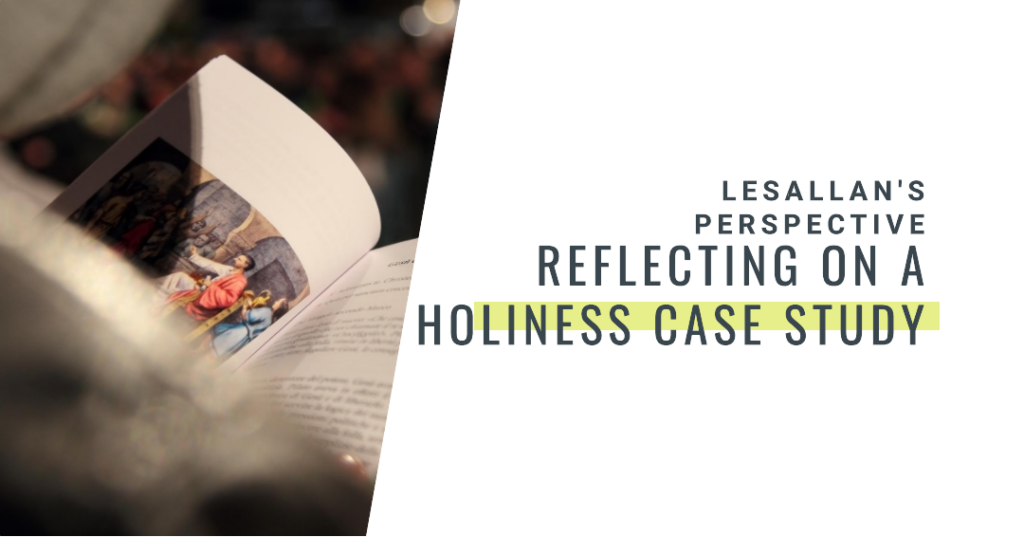Written By Lesallan – October 12, 2023

Holiness Case Study Reflection and Response
Lesallan
Ohio Christian University
THE4050 Investigating Christian Theology II (ONLF23)
Professor Jeremy Kamer
October 12, 2023
Holiness Case Study Reflection and Response
This is a challenging situation that many of us may face in our ministry contexts: how to deal with theological disagreements with our friends and colleagues. These are some thoughts on approaching this issue from a Wesleyan perspective and the articulation of a Biblical vision of holiness that is both faithful and hopeful.
I would first emphasize the importance of fostering friendship and open communication within the ministry. Tell them that it is vital that we support one another in our pursuit of spiritual growth and understanding, even when our perspectives may differ. I would attempt to explain that by engaging in meaningful dialogue, we both could learn from each other and challenge one another in a constructive manner. I would also let them know that it is equally important that we treat each other with respect and refrain from passing judgment based on personal beliefs or experiences. Telling them that instead, we should seek to understand and appreciate the unique perspectives we each bring.
Next, I would acknowledge the complexity and diversity of Biblical interpretation. The Bible is not a simple or straightforward book, and we should not expect to find easy or clear answers to every question. The Bible is a collection of diverse writings that reflect different historical, cultural, literary, and theological contexts. The Bible is also a living and dynamic book that speaks to different situations and challenges in every generation. Therefore, we should not claim to have the final or definitive word on any doctrine or issue, but rather humbly seek to understand the main message and purpose of the biblical authors, and how they relate to our own context and experience.
I would then propose a way of understanding Biblical and Wesleyan holiness. Holiness is not a static or abstract concept, but a dynamic and relational reality. Holiness is not a legal or moral status, but a personal and communal transformation. Holiness is not a future or eschatological hope, but a present and experiential reality. Holiness is not something that we achieve or attain by our own efforts or merits, but something that we receive and participate in by God’s grace and Spirit.
The Bible presents a powerful concept of holiness. It is based on God, who is holy and perfect in love and justice. God is separate from His creation and transcends in power and glory. His holiness is shown through His efforts to save humanity from sin and evil, to restore His image in us, and to renew His relationship with His people. Jesus Christ is the ultimate manifestation of God’s holiness, embodying His love and radiance. By following Jesus, we can learn to be holy by living obediently, showing compassion, and having power over our enemies. Jesus died for our sins, rose to justify us, and sent us His Spirit for our sanctification.
Wesley believed in holiness, which involves restoring God’s image in humanity through natural and moral dimensions. Love is the most important aspect of holiness, summarized in following God’s law to love Him and our neighbor. Without love, holiness is unattainable. Wesley believed that holiness is both a process and a goal for Christians. He identified two stages of holiness: initial sanctification and entire sanctification. The former is the beginning of holiness in regeneration, while the latter is the completion of holiness in perfection. Wesley believed in people needing God’s grace and acknowledged the reality of sin. He encouraged Christians to pursue holiness in the present, as it is necessary and brings joy.
I would respectfully disagree with my friend’s perspective that there is no Biblical foundation for comprehending the holiness of the heart prior to the end of days. Furthermore, I challenge his assertion that Wesley misinterpreted his eschatology. The Biblical concept of holiness encompasses what God intends to do in the future and what He is doing in the present. The Wesleyan idea of holiness involves what we will become in heaven and what we can achieve on earth. I encourage him to reconsider his understanding of holiness and to explore the possibility of experiencing more of God’s grace and Spirit in his life and ministry.
References:
Collins, K. J. (2007). The Theology of John Wesley: Holy Love and the Shape of Grace.
Nashville, TN: Abingdon Press.
Maddox, R. L. (1994). Responsible Grace: John Wesley’s Practical Theology. Nashville, TN:
Kingswood Books.
Outler, A. C. (Ed.). (1964). John Wesley. New York, NY: Oxford University Press.
Watson, D. L. (1990). God Does Not Foreclose: The Universal Promise of Salvation. Nashville,
TN: Abingdon Press.


